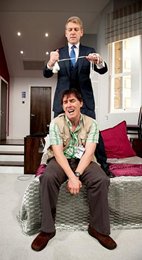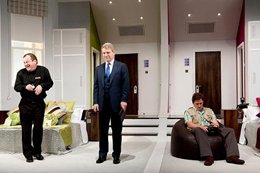The Painkiller is a new adaptation of Francis Veber’s Le contrat, which was filmed in 1973 as L’emmerdeur (usually translated as A Pain in the Ass) with Jacques, and again in 1981 as Buddy Buddy, with Jack Lemmon and Walter Matthau. It tells the story of a contract killer who checks into a hotel while on a job, only to find his mission disrupted by the presence of an irritating, suicidal guest in the next room. In this new adaptation by Sean Foley, Kenneth Branagh plays the sniper, Ralph, who plans to shoot his target from his hotel room window. In the next room photographer Dudley, played by Rob Brydon, mourns the end of his marriage and plans to commit suicide. The other characters are a camp hotel porter (Mark Hadfield), a  policeman (Andy Moore), Dudley’s estranged wife Michelle (Claudia Harrison) and her lover, Dr. Dent, a psychiatrist (Stuart Graham). When, in the opening scenes, Dudley tries to hang himself from the shower and pulls the pipes from the wall, the resulting noise and mess attract the attention of the porter. He begs Ralph to keep an eye on Dudley, and Ralph reluctantly agrees since the alternative is to involve the police. The action unfolds from that point, with Ralph becomes increasingly hampered and irritated by Dudley, and the porter popping into the room at inopportune moments to check that everything is alright.
policeman (Andy Moore), Dudley’s estranged wife Michelle (Claudia Harrison) and her lover, Dr. Dent, a psychiatrist (Stuart Graham). When, in the opening scenes, Dudley tries to hang himself from the shower and pulls the pipes from the wall, the resulting noise and mess attract the attention of the porter. He begs Ralph to keep an eye on Dudley, and Ralph reluctantly agrees since the alternative is to involve the police. The action unfolds from that point, with Ralph becomes increasingly hampered and irritated by Dudley, and the porter popping into the room at inopportune moments to check that everything is alright.
The Painkiller is a farce, a genre that is characterized by unlikely and complicated events, misunderstandings, mistaken identities, fast-paced action and broad physical comedy. The plot is too convoluted to summarize, but the scenes involve Dent mistaking Ralph for Dudley and injecting him first with a sedative and then, to revive him, with amphetamines. Branagh plays the killer firstly too drugged to fulfill his murderous plans and then too jittery, and every opportunity for physical play is exploited to the maximum. It played to a full house and was enthusiastically received by the Lyric audience on the night I saw it.
The set is two boutique-style hotel rooms, their boundaries demarcated by a curve of wall and a dividing line down the centre of the floor. By making the two rooms visible simultaneously to the audience, the stage business can include long sequences of where the characters mirror each other, or play against each other. Dudley praises Ralph’s goodness and gentleness to his wife, as they sit in his hotel room; meanwhile next door Ralph is brutally beating up the policeman, in full view of the audience, the beating punctuated to the rhythm of the dialogue. In another scene, Ralph’s tussle with the policeman and Dudley’s struggle with Dr. Dent places them in apparently sexual positions, as the porter opens first one door and then the other, increasingly startled by the proclivities of his guests.
 The performances of Brydon and Branagh are the most enjoyable elements, and Stuart Graham performs the role of the psychiatrist well. Harrison is given the difficult task of playing the poorly written ex-wife who seems to come from another era, although the set and costumes suggest the present moment. She is deprived of occupation and opinion and seems to have gone from financial dependency on her husband to her lover. Although characters in farce are usually types, she seems oddly dated, perhaps insufficiently revised from the 1973 original. The hotel porter has one note – he is camp, and that is apparently enough to make him funny. His catchphrase, "Enjoy!", ends all his appearances on stage, whether he is delivering coffee or encouraging the unwitting sexual acrobatics of the characters.
The performances of Brydon and Branagh are the most enjoyable elements, and Stuart Graham performs the role of the psychiatrist well. Harrison is given the difficult task of playing the poorly written ex-wife who seems to come from another era, although the set and costumes suggest the present moment. She is deprived of occupation and opinion and seems to have gone from financial dependency on her husband to her lover. Although characters in farce are usually types, she seems oddly dated, perhaps insufficiently revised from the 1973 original. The hotel porter has one note – he is camp, and that is apparently enough to make him funny. His catchphrase, "Enjoy!", ends all his appearances on stage, whether he is delivering coffee or encouraging the unwitting sexual acrobatics of the characters.
The slick production values, Brydon’s comic timing and Branagh’s skill in physical comedy cannot disguise that this is a tired play, and it is not clear why Foley would have chosen to write this new adaptation. At eighty minutes running time it feels overly long. A number of jokes – particularly that one about the policeman in the wardrobe – are stretched beyond breaking point, and the humour depends far too heavily on jokes about homosexuality. Historically, farce is often paired with satire, since farce is forgiving of human frailty while satire offers critique. But there is no satire here to balance the evening’s entertainment. Overall the work appears dated and deeply conservative, serving up outmoded stereotypes and double-entendres in place of wit and mischief. It is only saved by the skill of the performers, who are sorely wasted in this. If this piece is indicative of the programming of the new Lyric, it is wasting an opportunity to deliver something fresh and exciting to its audience.
Lisa Fitzpatrick